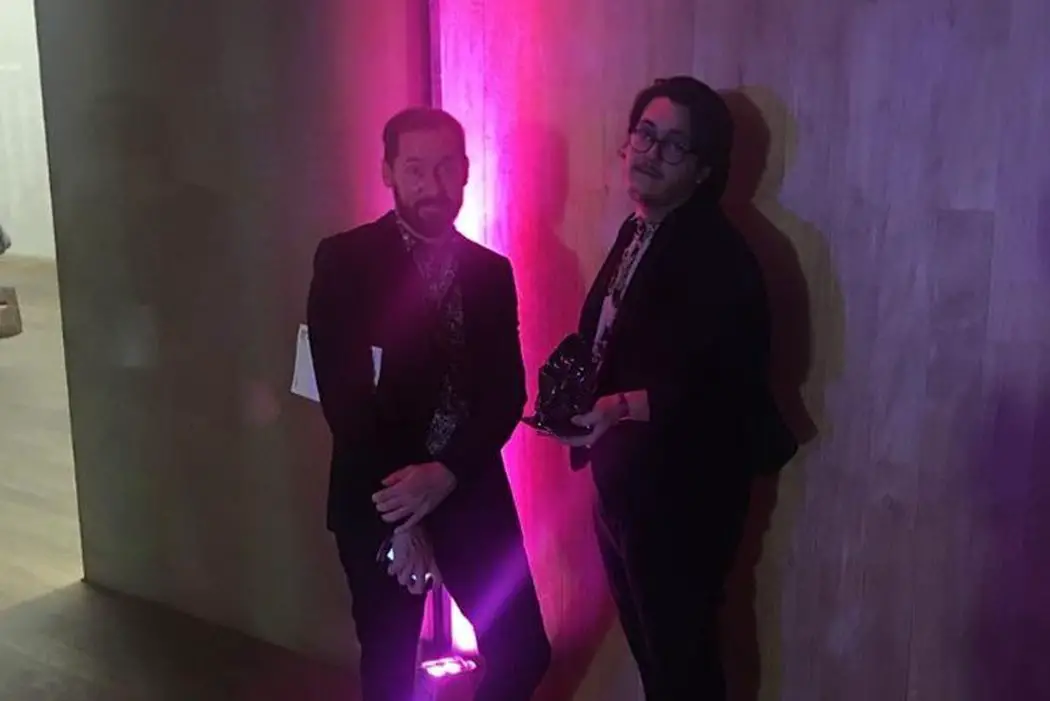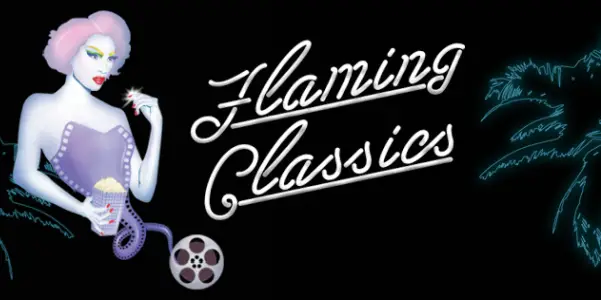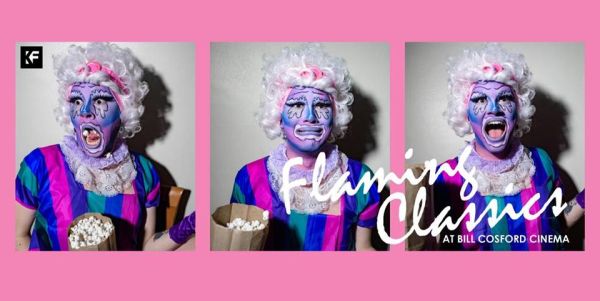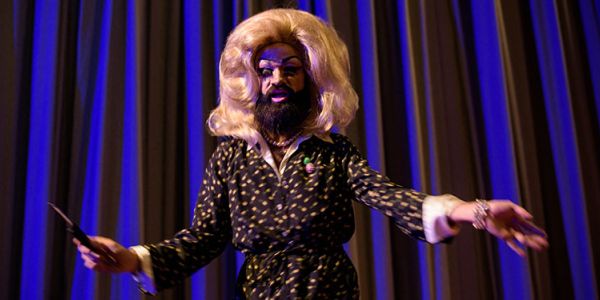Interview: New Film Series Unifies & Broadens Miami’s Queer Landscape

All articles contributed by people outside of our team are…
Juan Barquin and Trae DeLellis are film curators, but they might also make decent marketers. In a way, the roles accomplish parallel duties: their celebrated film series — Flaming Classics — is brilliantly named, expertly branded, and successfully builds an interdisciplinary community connecting queer, drag, and cinematic circles. The collaborators (Barquin a film critic, DeLellis a PhD student) reside in Miami where they’ve witnessed a renaissance in their city’s arts and LGBTQ scene.
Flaming Classics, turning one this May, has helped contribute to this evolution by screening films from the queer, camp, and feminine canon. Films have ranged from cult favorites like Heathers to Disney’s The Little Mermaid. After each movie, local drag artists perform songs and skits that reflect the themes and plot of the movie shown. It’s an original and adaptable concept, one that’s been bolstering underrepresented populations. Recently, the series gained wider attention: in December, Flaming Classics won a $25,000 Knight Arts Challenge Grant to continue celebrating queer visibility in film. It’s a momentous award for a scrappy series with refined taste — let the film roll and the queens dance.
Billy McEntee: What was the genesis for this series?
Juan Barquin: The idea came at Gramps, a bar in Wynwood [a neighborhood in Miami]. We’ve been living here for God knows how long and noticed that while there’s excellent repertory cinema in Miami, a lot of it has skewed toward a masculine atmosphere. We’ve always wondered, “Well, where are all the queer films? Where are all the feminine films?” There was one night in particular that kind of set us off — it was a screening of Boogie Nights on 35 mm at midnight. There’s a scene where Philip Seymour Hoffman’s character says to Marky Mark that he has an attraction to him. And he has this breakdown; it’s an emotionally heartbreaking moment, and this guy in the audience starts making fun of Hoffman’s character, trying to get the house to go along with it. So that was the moment where we thought there needs to be programming that enables a safe space.
Trae DeLellis: The drag culture has grown a lot here. We’ve always loved the idea that drag tells a narrative through its performance but also give you emotion, like cinema. So many drag queens and kings are inspired by film, so it felt like pairing them was a perfect marriage.
How does a typical Flaming Classics event unfold?
Trae DeLellis: We introduce the context of the film, show the film, and then let the drag artists take over and create something inspired by the film.
Juan Barquin: Sometimes they’ll take dialogue from the movie, or they’ll make something unrelated. They’ll sing songs that fit in with the film’s themes, but it varies performer to performer.

Trae DeLellis: We like to keep that kind of collage mixture because that’s very queer in itself; re-appropriating things and mixing them together to make something different. We started out with just three performers (Jupiter Velvet, Queef Latina, Miss Toto) we knew very well for the first six films. They are always paid; that’s always been important to us. It’s always been good for the promotion too — no one’s better at self-marketing than a drag queen. The hustle is such a part of it. It’s about the film, but also these performers. That’s been one of the most rewarding part of it: seeing how much thought and preparation and detail goes into these performances.
How many drag artists have you worked with?
Juan Barquin: Fifteen or sixteen thus far.
And where do the events usually take place?
Trae DeLellis: The University of Miami [where Trae studies and teaches] has its own movie theater, the Bill Cosford Cinema. It’s an arthouse theater, so a destination for people off campus too. And sometimes we host the events outside of the cinema — we did a screening of The Little Mermaid in a pool at the university, so we had the drag performers in the water.
Did you face any difficulties in mounting this project?
Trae DeLellis: It was difficult to start, just getting everyone’s attention. The concept was enough of a hook for different communities, but the onslaught of running it for the two of us can be a little daunting. In October we got a little ambitious and tried weekly screenings. We usually do only one a month. We run everything, so we’re pretty exhausted by the end of it. We do have friends who volunteer for concessions and photography. There’s been a lot of support from the community, and luckily we don’t need to pay to use the facility. It seats 241 people.
Do you feel you’re able to fill those seats?
Trae DeLellis: It depends on the movie. Normally we get 50 to 75 people. We didn’t feel like, at first, we were getting a lot of repeat people; it depends on the film.
Juan Barquin: We did Hocus Pocus and that was packed.
Can you share how you were able to build an army of drag performers at your events?
Juan Barquin: We’re fairly friendly with most of the drag queens and kings because I’ve been attending and covering their events. We both had people approach us, saying they’ve heard about it and wanted to get involved, and we’ve also reached out to drag artists who we’ve seen at different parties — Counter Corner, Double Stubble —throughout the city. As we saw more performers we started thinking and choosing and curating who would be best for X film, regardless of whether or not we were friends with them.

Trae DeLellis: Many we’ve reached out to via Instagram. With drag performers, it’s usually all confidence on stage. They’re always the sweetest people, but I’ve been most surprised by how shy some of them can be. I also want to say we have a number of drag kings, which is kind of rare. There’s a lot here, more than the average city. When you look at the queer canon, it’s actually not always the most inclusive. It often skews white and male. So we try and diversify the programming — we did Gentlemen Prefer Blondes and Miss Toto followed that by rapping and singing “Bitch Better Have My Money” by Rihanna.
That’s amazing. And congratulations on the Knight grant! What plans do you have to best use this funding?
Trae DeLellis: We’re still matching the grant; we have to find $25,000 to make it $50,000 total. We’ve been tailoring proposals to other grants. In June, which is Miami Film Month, we received a grant from the Florida Humanities Council to present films with a queer bent that focus on Florida. The grant takes so much pressure off of us in terms of cost; we actually now get paid. That’s an important part of the Knight’s mission, that the creators get paid. It’s also freed us up to go a little more to the edge.
In April we’re doing Orlando by Sally Potter, which isn’t I imagine a crowd-pleasing film, but the pressure of having things funded is gone. We have an awesome performer lined up for that and want to introduce more queer audiences, which wouldn’t be possible without the Knight Foundation’s support. We can also pay the drag queens more than when we started.
Juan Barquin: Not only are the drag artists getting paid, but we’re hiring local artists to design the artwork for our series, and film critics to submit writing on each film and how they are queer. We can print those in programs and put them online as educational content. We can pay people to film the performances and do photography. The grant lets us do everything not just on a grander scale but with a fair amount of payment for everyone.
You’re approaching your 25th film and your one-year anniversary. Is there anything you are reflecting on?
Juan Barquin: I want to keep exposing as many people as possible to a canon that they’re not going to get from anyone else. You can go anywhere and get Quentin Tarantino, Christopher Nolan, but they’re not part of this canon of films that highlight these queer bodies, these minorities who are not represented. Every movie we’ve done has been female-focused with feminist protagonists, which we think is cool. We want to bring more depth and keep on doing this as long as physically possible.
Trae DeLellis: We’d love to bring the program over the country. People are animated watching the movies.
Juan Barquin: You watch movies alone, but it’s different when you see it in a group setting. It’s such a refreshing experience.

Do you feel like Flaming Classics is helping diversify your city?
Trae DeLellis: Miami is a city that has changed so much recently. I’ve felt more comfortable in its queer scene over the last few years, and I think it’s gotten so much more diverse. I hope what we’ve done is a part of that.
Juan Barquin: It’s also about changing the image of the city. It’s not just beaches and parties, and of course Moonlight has helped change that perspective. There are so many artists in this city making it what it is and helping it flourish. A decade ago none of this existed for me. I was so frustrated there weren’t any art houses, and now there are six or seven doing all kinds of different programming. There are all these queer events breaking all these identities within the city.
Trae DeLellis: The night we accepted the award — we had shot this image of the drag queens with popcorn to have a graphic when our award came up. And when it went up, I thought how the Knight Foundation has supported art before, but this was the first time they were supporting drag within the art. And to see it in a giant art museum…I love what we’ve done, but it’s really about these performers more than anything. So it was a really proud moment for these performers — but also for drag in general, and how it’s being legitimized.
Find more information on Flaming Classics here, and follow Trae and Juan on Twitter, here and here.
About the author
 Billy McEntee is a Brooklyn-based arts journalist. His articles have appeared in Indiewire, The Brooklyn Rail, Brooklyn Magazine, and HowlRound, among others.
Billy McEntee is a Brooklyn-based arts journalist. His articles have appeared in Indiewire, The Brooklyn Rail, Brooklyn Magazine, and HowlRound, among others.
Does content like this matter to you?
Become a Member and support film journalism. Unlock access to all of Film Inquiry`s great articles. Join a community of like-minded readers who are passionate about cinema - get access to our private members Network, give back to independent filmmakers, and more.
All articles contributed by people outside of our team are published through our editorial staff account.













